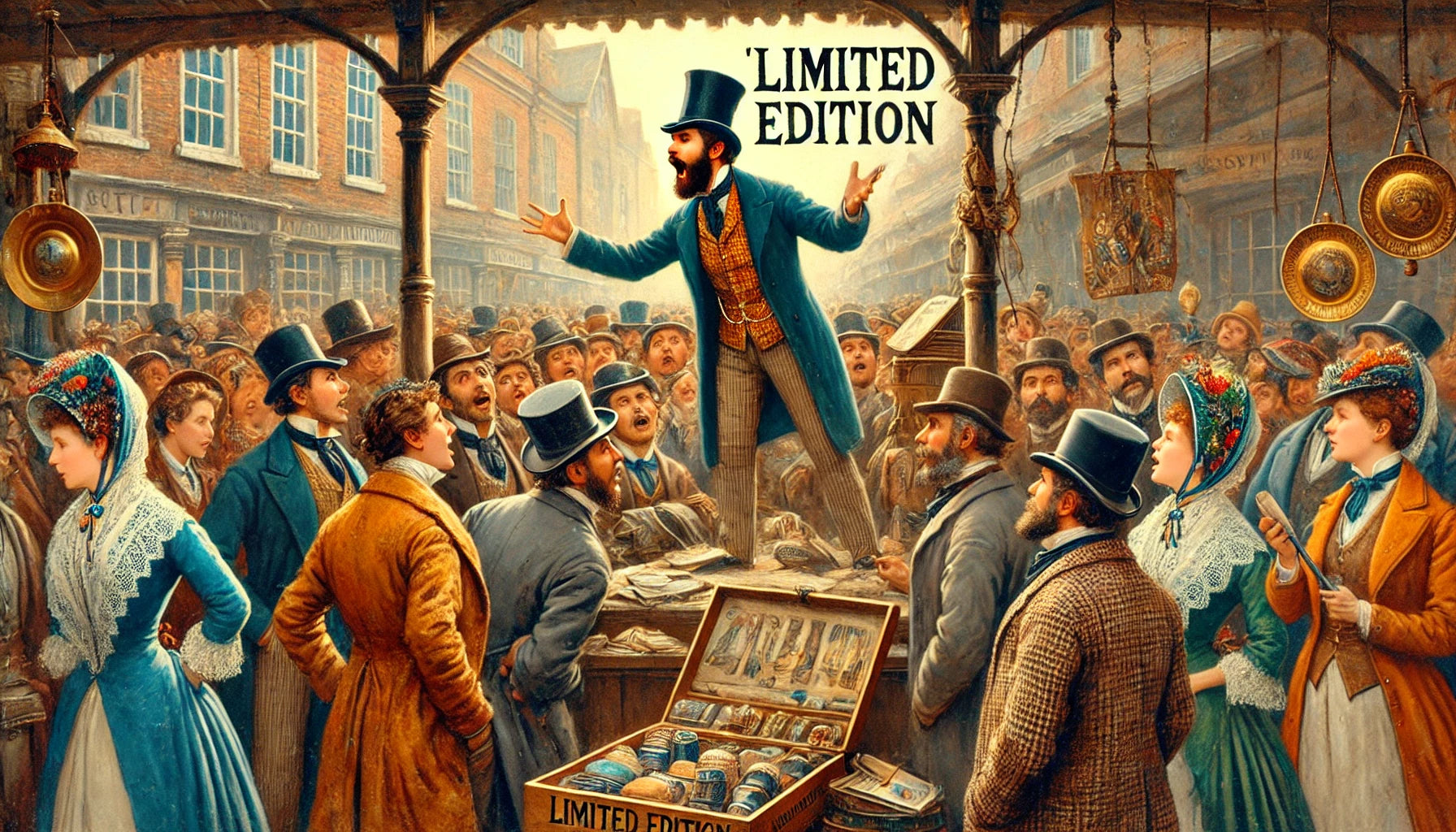Quick Overview
Limited edition marketing is a tactic companies use to tap into consumers' fear of missing out (FOMO). By creating the perception of scarcity, brands make products seem more valuable and exclusive. This strategy drives urgency, leading customers to purchase sooner and at higher prices.

Common Questions & Answers
1. Why do companies use limited edition claims?
To create urgency and exclusivity, encouraging immediate purchases. The fear of missing out drives customers to act quickly.
2. Does this strategy actually work?
Yes, studies show that scarcity can boost perceived value and trigger quicker purchasing decisions.
3. How do consumers respond to limited edition products?
Consumers often see them as special or unique, increasing desirability and status for owning one.
4. What types of products benefit from this strategy?
Anything from sneakers to food items can leverage limited editions to boost sales.
5. Are limited editions always truly limited?
Not always. Sometimes, "limited" is more marketing hype than reality.

Step-by-Step Guide to Create a 'Limited Edition' Product
Step 1: Select the Right Product
Choose an item that aligns with your brand and has the potential for enhanced appeal with limited availability. Think collaborations or unique flavors/variants.
Step 2: Create a Sense of Urgency
Announce that your product is available for a limited time or quantity. Highlight this across your marketing channels with countdowns or early bird notifications.
Step 3: Emphasize Exclusivity
Position the product as something special, with unique features or packaging that stand out from your regular lineup.
Step 4: Use Strategic Timing
Launch during peak seasons or alongside relevant events. This aligns your limited edition with times when customers are more willing to splurge.
Step 5: Promote Across Multiple Platforms
Boost awareness by advertising your limited edition on social media, email campaigns, and through influencers to amplify its desirability.
Need more guidance? Schedule a consultation to explore effective strategies further.
Historical Context
The concept of "limited editions" dates back centuries, rooted in the luxury world where items like rare books and fine art prints were sold with restricted copies. This tactic migrated to mainstream retail by the late 20th century. The 1990s saw limited edition sneakers and collaborations with celebrities, tapping into consumers’ desires for exclusivity and status.
Today, companies from every industry—luxury fashion brands to fast-food giants—use this tactic. Think of collaborations between artists and brands like Nike, which have set the bar for creating buzzworthy, hard-to-get items.

Business Competition Examples
1. Supreme
The streetwear brand has built its entire business model around limited editions. By releasing products in small, infrequent batches, Supreme has cultivated a cult following willing to line up for hours.
2. McDonald's Szechuan Sauce
The fast-food giant brought back its Szechuan Sauce for a limited time, leveraging nostalgia and a pop culture reference to drive hype and huge sales.
3. Nintendo
The release of classic consoles, such as the NES Classic Edition, drove scarcity-induced buying frenzies. Limited availability made them some of the hottest tech items in their time.
4. Starbucks' Pumpkin Spice Latte
By only offering this drink seasonally, Starbucks has turned a simple beverage into an annual sensation that drives foot traffic and sales.

Discussion
The power of 'limited edition' products lies in the psychology behind scarcity. When something is limited, it feels more desirable. This is an evolution of basic economic principles: when supply is low and demand is high, perceived value skyrockets. Companies play on this instinct, drawing consumers in with the promise of exclusivity and the potential to own something their peers may not.
However, some argue that overusing this tactic can dilute its impact. Brands need to maintain trust; if a product that's labeled as "limited" keeps coming back or isn’t as exclusive as suggested, consumers might grow skeptical.

The Debate
For Limited Editions
They enhance brand prestige, create buzz, and push sales through urgency. Consumers often enjoy being part of a select group that owns an exclusive item.
Against Limited Editions
When overused or manipulated, consumers can feel deceived, leading to trust issues. It's essential to balance genuine scarcity with marketing hype.

Takeaways
- Limited editions effectively increase product desirability and sales.
- Perceived exclusivity is key; even a simple packaging change can add value.
- Ensure credibility by maintaining honesty about product availability.
- Pair this strategy with robust promotional efforts for maximum impact.
- Be mindful of consumer trust—overplaying the tactic can backfire.

Potential Business Hazards
1. Loss of Consumer Trust
Repeated false "limited editions" can erode customer faith in your brand. Transparency is vital to maintain credibility.
2. Inventory Risks
Misjudging the demand for a limited edition can result in excess unsold stock or disappointed customers.
3. Brand Dilution
Too many special editions can make the tactic feel routine, losing its impact over time.
4. Legal Issues
False advertising claims could lead to consumer protection complaints if products aren't truly limited.

Myths and Misconceptions
Myth 1: Limited Editions are Always High Quality
Not necessarily. Sometimes, the exclusivity is in name only, with the product being average in quality.
Myth 2: Limited Editions Must Be Expensive
While many are, a limited edition product can be affordable yet still appealing due to its uniqueness.
Myth 3: Only Luxury Brands Benefit
Any brand, even fast food or tech, can leverage limited editions to great effect.
Myth 4: Limited Editions Need Big Budgets
Creative tweaks in packaging or slight product variations can achieve the same effect without hefty investment.

Book & Podcast Recommendations
1. "Influence: The Psychology of Persuasion" by Robert B. Cialdini
A must-read for understanding how scarcity influences decision-making, crucial for effective limited edition strategies.
2. "Hooked: How to Build Habit-Forming Products" by Nir Eyal
Offers insights into why consumers repeatedly seek out limited edition products.
3. Podcast: "The Indicator from Planet Money"
Episodes dive into consumer behavior and marketing tactics that tie into the scarcity principle.
4. "Marketing Made Simple" by Donald Miller
Helps businesses structure marketing strategies, including exclusive product launches.

Legal Cases
1. FTC vs. Retailer on False Scarcity Claims
The FTC fined a company for falsely advertising products as limited editions. This case emphasizes the need for honesty.
2. Legal Action Over Collector Items
A class action lawsuit was filed against a company for misleading "limited" claims that weren't upheld. Brands should take note: keep your "limited" claims accurate.
3. Trademark Disputes in Limited Edition Collaborations
Legal cases involving partnerships, like sneaker collaborations, show how intellectual property can complicate such releases.

Share Your Expertise
Explore strategies to make your own products stand out at Miller IP’s resources for startups and small businesses.

Wrap Up
Limited editions are powerful tools that tap into FOMO and drive quick sales. Used well, they boost brand prestige and customer loyalty. However, the key is balance—maintaining consumer trust is essential for long-term success.













